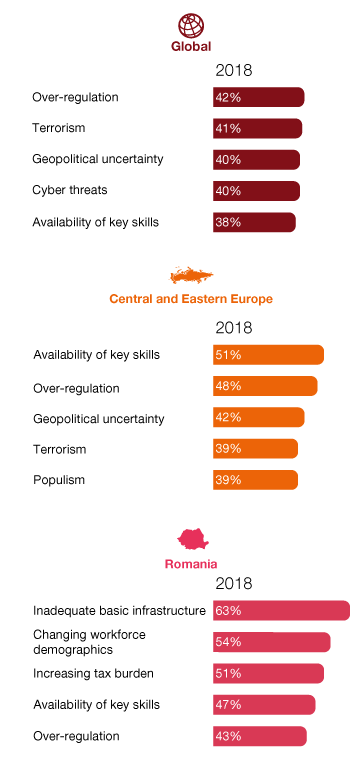38%
of CEOs in Romania are very confident of their own company's growth over the next 12 months
63%
of CEOs in Romania are extremely concerned about the inadequate basic infrastructure
99%
of CEOs in Romania are focused on improving soft skills in addition to digital technologies
If global CEOs are anxious optimists, their counterparts in Central and Eastern Europe are clear-eyed realists
They’re more pessimistic than most about the prospects for the global economy, but they have the smallest “optimism gap” of any region: the share of CEOs who are bullish on their own companies’ prospects is just 5 points lower than the percentage who are optimistic about the economy as a whole.
That’s no surprise, considering what CEOs in this region have come through in the past 25 years. After dealing with war, hyperinflation, economic collapse and wrenching social change, they’re ready for anything the world can throw at them. But there’s one homegrown worry that plagues them: how to attract and retain talent in the digital age.

Note: Respondents who answered “Extremely concerned”
Central and Eastern European CEOs look at the emerging list of global threats with confidence in their ability to cope with whatever the world throws at them
While CEOs in Central and Eastern Europe (CEE) are similar to their global peers in predicting a better year for the global economy than for their individual companies, two things make this region stand out.
First, our CEOs are more pessimistic than most about the economy as a whole: we have the second-lowest percentage predicting an improvement in global growth, at 45%. Second, and perhaps more interestingly, they’re more bullish on their own companies’ relative performance: we have the narrowest gap between forecasts for the world and for CEOs’ own organisations.
As many as 40% of them are “very confident” about their prospects for revenue growth in the next 12 months.
Message from Mihaela Mitroi, Tax and Legal Services Leader
"In the longer term, i.e. over the next five years, changes in customer behaviour, intensified and diversified global competition, changes in industry regulation, supply chains and core technologies of production or service provision are all seen as disruptive trends for organisations. These are only a few of the reasons why CEOs’ confidence in their companies’ revenue growth prospects over the next three years is slightly lower than in the preceding survey level. The hard-to-anticipate political changes (Brexit, developments in Catalonia, etc.), populism trends, terrorist attacks, stock market volatility and the disruptive effect of technology make it ever more difficult to forecast prospects for more than one year."
Message from Ionut Simion:
,,
Only a few years back, artificial intelligence, robotics, the Internet of things, drones and cryptocurrencies were mere fashionable concepts used in previews of trends expected to shape our future. Today they are part of our everyday life and have already generated new industries and jobs centred around them. But who will get those jobs created thanks to technological progress? Do organisations have a workforce skilled enough to make the most of the innovation-driven business opportunities?
Talent has always been a valuable asset, so attracting and retaining it is a real challenge. Moreover, talent with digital skills is a rare find. Finding and recruiting such talent is even more complicated for certain industries.
Having carefully read the answers given by executives in this year’s issue of the PwC CEO Survey, we find that the binding element of young talent, digital technologies and organisational success (despite the many challenges) is trust. At first glance, things seem straightforward, but in the age of transparency (with the Internet being more widely used), trust is a treasured currency.
CEOs make efforts not only to measure the customers’ and employees’ trust as an indicator of their companies’ long-term good health, but also to strengthen it. One of the ways to achieve this is by creating transparency in all business fundamentals: transparency about values, about the individual contribution of team members to the organisation’s success, about business and human resources (compensation and benefits included) strategy, diversity and inclusion policy, transparency around the taxes paid, and in the usage and storage of customer data, transparency in the supply chain and even about the impact of automation and artificial intelligence on jobs. And speaking of this last aspect, CEOs are aware of their organisations’ responsibilities for professional reintegration of employees whose jobs have been redefined by technology, and they have these people trained for the (more creative) jobs of the digital era, throughout their career. In order to build trust, companies contribute to philanthropic activities, invest in cyber-security protection and contribute to combating environmental issues.
“trust in Romania” is built around an educated healthy workforce and an appropriate core infrastructure. The businesses’ contribution to improving the employability of the future workforce is crucial, especially via internship and apprenticeship programmes, and by working together with education establishments. The authorities, organisations and local communities should join forces to improve employment rates by “equipping” future employees with the required sets of skills. The curriculum should meet the needs of the business environment halfway by focusing ever more on digital skills.
one of the benefits of the globalisation process, as recognised by CEOs, is the intensified exchange of knowledge and talent, which contributes to the large-scale dissemination of innovation and enhances productivity. Conversely, the many people still living on the edge of poverty and the widening income inequality gap are genuine problems of the global society, which erode trust in the current growth model. In order to see to what extent the “success” of globalisation shows in local social progress, prosperity will be increasingly measured through multifaceted metrics (including quality-of-life indices, along with the established macroeconomics measures). Defining those metrics and finding the methods to measure them accurately will be a priority in the coming years. And business leaders should get involved in this difficult approach, which goes beyond figures, by putting to use their experience to assess the impact and contribution of their organisations to their communities (in terms of economic, social and environmental issues). As every year, our thanks go to the executives in Romania who invested some of their precious time to share with us the views on which the eighth issue for Romania of our PwC CEO Survey is based. It is an honour for us to make their opinions heard.
Contact us
Manager, Marketing and Business Development , PwC Romania
Tel: +40 21 225 3547










